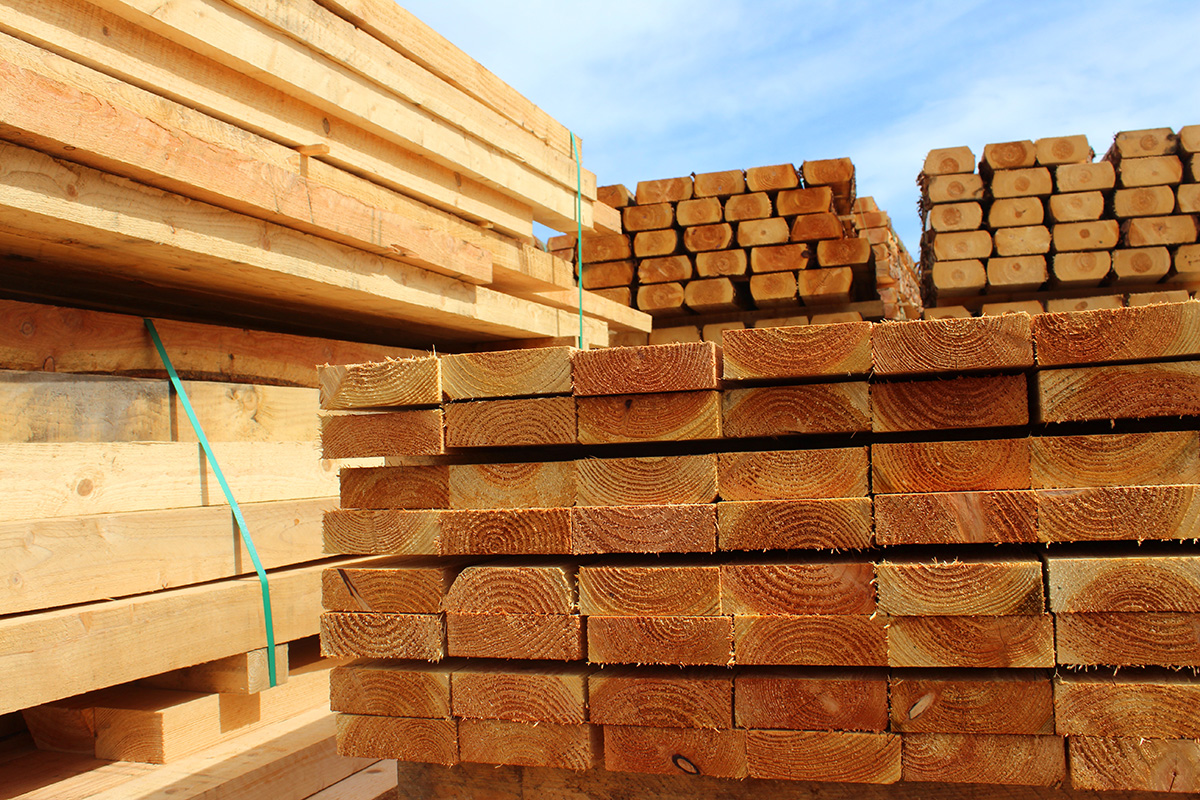For many manufacturers, choosing a lumber supplier can seem like a daunting task. Making the wrong decision can cause your manufacturing process to slow, your shipments to be delayed, and your products to go unfinished – a logistical and financial nightmare.
Choosing the right lumber supplier, however, can have the inverse effect. Reliably receiving the lumber you need means that you can start your projects without delay, justify the cost of your materials, and ensure that your lumber is in the right place at the right time. Whether your lumber’s function is to be used as dunnage or to be used as materials for the construction of a product, choosing the right lumber supplier can have a huge effect on your business!
Choosing a lumber supplier is an incredibly important decision.
So, before you invest in a new relationship with a lumber supplier, it’s important to ask yourself a few questions. Luckily, we’ve laid out some of the most important ones here.
1. How much lumber do you need?
Determining the quantity of lumber you need can narrow your options pretty quickly! If your business is only needing a small amount of lumber, say a one-time order of half a truckload of 8 foot 2x4s, this can shrink your options substantially. Due to the increasing scarcity of lumber, many mid-sized lumber companies are having to become more particular in what business they have to take. If this describes you, you’ll find that you’re probably going to want to seek a smaller local lumber distributor.
On the other hand, if your business needs two truckloads of lumber coming in every week for the foreseeable future, a larger lumber supplier would be the way to go. For instance, at Conner, we leverage our buying power to receive monthly shipments from various sawmills across the US. These consistent shipments of wood have proved to be mutually beneficial to both us and the sawmills.
2. What type of lumber does your business need?
If you’re new to working with lumber companies, you’ll be shocked by the variety of lumber that’s on the market. Knowing what type of lumber your business needs can drastically simplify your search. When it comes to lumber suppliers, there are quite a few different kinds.
- Industrial lumber suppliers – These types of lumber suppliers, like Conner, primarily work with manufacturers to provide for industrial applications. Industrial lumber isn’t pretty and is rough around the edges, but it can efficiently get the job done at a cost-effective price. For the most part, these types of lumber suppliers mostly work with #3 or #4 softwoods, although many offer industrial hardwood as well. Despite being cost-effective, the durability and toughness of this lumber are nothing to scoff at.
- Construction lumber – This one is pretty self-explanatory. If your business needs materials to build a structure, this type of lumber supplier is for you. The type of lumber found here is largely #2 softwoods, with the rare usage of #1 softwood.
- High-Grade Lumber – These lumber suppliers provide businesses with only the highest grades of lumber. Typically, this lumber is used in the construction of furniture, flooring, and other consumer goods.
- Hardwood Lumber – Some lumber suppliers specialize in hardwoods only, providing all grades of hardwood from industrial hardwood dunnage to unblemished hardwoods meant for flooring.
3. Can the lumber supplier consistently meet your needs?
We know that vetting your lumber supplier is important to you. After all, you’re on the third step already! Ensuring that your lumber supplier can meet your needs consistently is incredibly important. Delays in your shipments of lumber can cause problems throughout your manufacturing process – Causing idle time in your manufacturing process, delaying the shipments of your finished products, and ultimately leading to a delayed order for your consumers. If you’re choosing a lumber supplier, it’s important to factor in the ways that the supplier’s actions could affect your business.
When vetting a lumber supplier, it’s important to look at the history of the company you’re considering
- How have they handled labor shortages?
- How have they handled fiber shortages?
- What’s the track record of this lumber supplier?
Along with these questions, you should also take a look at the different geographic locations a potential supplier has. Are they in your area? How many plants do they have nationwide? Answering these questions can give you insight into the ability of a lumber supplier to provide for all of your needs.
4. How is the lumber supplier’s customer service?
In any form of business, customer service is one of the factors that separates the mediocre from the great. While many businesses can provide you with lumber, is it worth it if it’s a pain working with your supplier? We all know the answer to that – definitely not.
With such an important role in your business, your lumber supplier can have an incredibly large effect on your day-to-day operations. The difference between a lumber supplier that treats you like a partner and one that treats you like a number can make a massive difference.
With a mid-sized lumber supplier, you can get the best of both worlds.
When it comes to large multinational suppliers, oftentimes customers can be routed to different departments, constantly interact with prerecorded instructions, and frustratingly put on hold. If you’re dealing with an urgent need, this is simply unacceptable.
On the other hand, working with small local businesses can be problematic as well. Although you may be contributing to the local economy, you very well may be sacrificing the capability of your lumber supplier. With these small mom-and-pop suppliers, sometimes manufacturers can find frustration when problems arise such as a labor shortage or fiber scarcity.
As we previously mentioned, a mid-sized lumber supplier sometimes works best! With the ability to meet your needs consistently and simultaneously still value your business, you get the advantages of both large and small suppliers without the pitfalls of either.
5. Are You Prepared to Foot the Bill?
Buying lumber may seem like a simple process, but the sticker shock can be real after factoring in all of the cost-related factors.
The Cost of Lumber
Unlike many other products, lumber is a commodity – similar to oil, natural gas, or steel. That being said, price fluctuations can hit swiftly and unexpectedly due to a myriad of factors. Wildfires, mudslides, beetle infestations, supply chain issues, and labor shortages can all have a significant impact on the availability of lumber. For instance, throughout 2020 and 2021, lumber populations were devasted in the Pacific Northwest, affecting the price of lumber across the nation. Even if the problems are occurring 1000 miles away, they can still affect the price!
The Remanufacturing Process
Lumber suppliers that buy from the mill often have very limited options to choose from when it comes to different dimensions. Since sawmills deal in such a vast quantity, it simply isn’t feasible for them to offer a ton of variation. This leaves the lumber suppliers to fill this role.
If you’re ordering custom-cut wood, then be prepared to see a price increase from the regular price per board foot. This increase is due to the additional labor and time it takes suppliers to remanufacture your lumber.
Freight Rates
In case you’ve been living under a rock, gas prices have been ridiculous lately! International events, like the current sanctions the United States has levied on Russia or the current administration’s policies on fossil fuels, can have a drastic impact on freight costs. When moving lumber, don’t be surprised if the transportation bill is a little higher than normal. To justify the service, many transportation and manufacturing companies are starting to add a fuel surcharge for every shipment. Keep in mind that with freight cost, every mile means the fee will be a little higher. Having a lumber supplier close to home just might help!
With Answers to These Five Questions, You Should be Prepared!
Before you pull the trigger on a lumber supplier, make sure you’ve answered these important questions. Finding answers to them won’t just give you insight into what you’re looking for in a lumber supplier, but it will also give you insight into what you need as a business.
It may seem tedious to do all this thinking before finding the right partner, but remember, the partner you choose has quite the responsibility. Your production lines, customers, and employees all depend on getting the materials they need – Choosing the right lumber supplier is essential!



![[PRESS RELEASE] Conner Industries Announces Major Guardian Packaging Expansion](https://conner.b-cdn.net/wp-content/uploads/2024/10/Guardian-Packaging-Expansion-500x383.jpg)
![[PRESS RELEASE] Conner Industries Announces Website Dedicated to Integrated Packaging Division](https://conner.b-cdn.net/wp-content/uploads/2024/05/Conner-Packaging-Blog-500x383.jpg)


